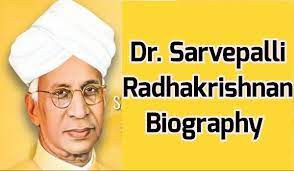Dr. Sarvepalli Radhakrishnan: Early Life, Education and Career

Dr. Sarvepalli Radhakrishnan: Early Life, Education and Career– Dr. Sarvepalli Radhakrishnan was a multifaceted personality who left an indelible mark on Indian history as a scholar, philosopher and statesman. While he is best known for his time as India’s second President, his contributions to philosophy, education, and the propagation of Hinduism and Vedanta are as noteworthy.
Daily Current Affairs Quiz: September 2023
Early Life and Education
Sarvepalli Radhakrishnan was born in Tiruttani, Madras Presidency, British India, on September 5, 1888. His parents, Sarvepalli Veeraswami and Sarvepalli Sita, were Telugu-speaking Niyogi Brahmins from the Nellore area of Andhra Pradesh. Radhakrishnan’s early education took place in Thiruttani and Tirupati, but it was at Madras Christian College where he truly excelled, graduating in 1906 with a Master’s degree in Philosophy.
Academic Achievements
Sarvepalli Radhakrishnan embarked on a distinguished academic career, starting as a professor of philosophy at Madras Philosophy in 1909. In 1918, he was appointed Professor at the University of Mysore, where he wrote important papers and books on philosophy, including “The Philosophy of Rabindranath Tagore” and “The Reign of Religion in Contemporary Philosphy.” In 1921, he assumed the prestigious King George V Chair of Mental and Moral Science at the University of Calcutta. His academic accomplishments led him to deliver notable lectures, receive a knighthood and serve as Vice-Chancellor of Andhra University and Spalding Professor at the University of Oxford.
International Recognition
Radhakrishnan’s global influence began with his attendance at international conferences and lectures. He participated in the International Congress at Philosphy at Harvard University and the British Empire Universities Congress, earning recognition as an expert in India thought. Another key milestone in his intellectual journey was his delivery of the Hibbert Lecture, “An Idealist View of Life,” at Manchester College, Oxford.
Oxford Professorship and Nobel Nomination
In 1936, Radhakrishnan became a Fellow of All Souls College, Oxford and was appointed the Spalding Professor at Eastern Religions Ethics. He was nominated for the Nobel Prize 27 times, 11 times for the Nobel Peace Prize and 16 times for Literature, highlighting the global recognition of his accomplishments.
Political Career
Sarvepalli Radhakrishnan entered politics later after establishing himself as an international authority in philosophy. He actively participated in the Andhra Mahasabha in 1928 and supported the renaming of the Ceded Districts division as Rayalaseema. After India gained independence, he represented the nation at UNESCO and served as India’s Ambassador to the Soviet Union. Radhakrishnan was elected to India’s Constituent Assembly and later became the country’s first Vice-President in 1952. Later, from 1962 to 1967, he served as India’s second President. His political reasons sprang from a desire to protect Hindu culture and Indian intellectual heritage.
Celebration of Teacher’s Day
When Dr. Sarvepalli Radhakrishnan assumed the presidency of India, his students and friends approached him with a request to celebrate his birthday on September 5. In a humble response, he suggested that the day be dedicated to honoring teachers instead. Since then, 5th September has been celebrated as Teachers’ Day in India, a tribute to the profound impact of educators on society.
Philosophical Legacy
Radhakrishnan’s most enduring legacy lies in his philosophical contributions. He bridged the gap between Eastern and Western thought, defending Hinduism against Western misconceptions. He argued that Advaita Vedanta, with its emphasis on intuition and inner realization, represented the pinnacle of religious experience.
Awards & Honors
Dr. Savepalli Radharishnan received many award & honors, some of the important honors are as follows:
| Honor | Year | Country |
| Knight Bachelor | 1931 | British India |
| Bharat Ratna | 1954 | India |
| Order of the Aztec Eagle | 1954 | Mexico |
| Pour Le Merite | 1954 | Germany |
| Order of Merit | 1963 | United Kingdom |